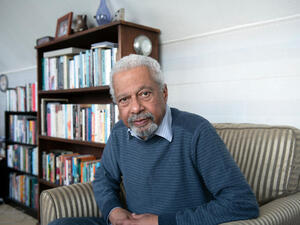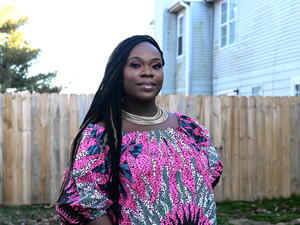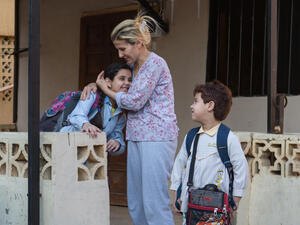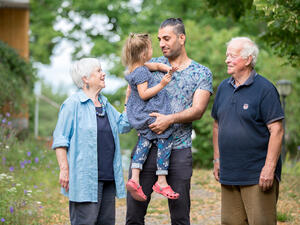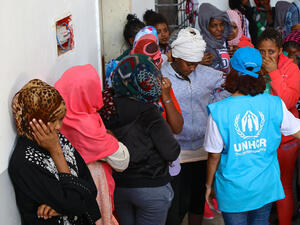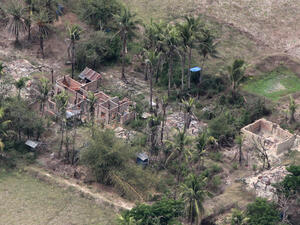UNHCR warns of dangerous new era in worldwide displacement as report shows almost 60 million people forced to flee their homes
UNHCR warns of dangerous new era in worldwide displacement as report shows almost 60 million people forced to flee their homes
A UNHCR report, released today, shows that worldwide displacement from wars, conflict, and persecution is at the highest levels we have recorded, and accelerating fast.
UNHCR's new annual Global Trends report shows a sharp escalation in the number of people forced to flee their homes, with 59.5 million people forcibly displaced at the end of 2014 compared to 51.2 million a year earlier and 37.5 million a decade ago. The increase since 2013 was the highest ever seen in a single year.
The main acceleration has been since early 2011 when war erupted in Syria, propelling it into becoming the world's single largest driver of displacement. In 2014, an average of 42,500 people became refugees, asylum seekers, or internally displaced every day, representing a four-fold increase in just four years. Worldwide, one in every 122 humans is now either a refugee, internally displaced, or seeking asylum. Were this the population of a country, it would be the world's 24th biggest.
"We are witnessing a paradigm change, an unchecked slide into an era in which the scale of global forced displacement as well as the response required is now clearly dwarfing anything seen before," said UN High Commissioner for Refugees António Guterres. "It is terrifying that on the one hand there is more and more impunity for those starting conflicts, and on the other there is seeming utter inability of the international community to work together to stop wars and build and preserve peace."
UNHCR's report shows that in region after region, the number of refugees and internally displaced people is on the rise. In the past five years, at least 15 conflicts have erupted or reignited: Eight in Africa (Côte d'Ivoire, Central African Republic, Libya, Mali, northeastern Nigeria, Democratic Republic of the Congo, South Sudan and this year in Burundi); three in the Middle East (Syria, Iraq, and Yemen); one in Europe (Ukraine) and three in Asia (Kyrgyzstan, and in several areas of Myanmar and Pakistan). Few of these crises have been resolved and most still generate new displacement. In 2014 just 126,800 refugees were able to return to their home countries, the lowest number in 31 years.
Meanwhile, decades-old instability and conflict in Afghanistan, Somalia and elsewhere means that millions of people from these places remain either on the move or - and increasingly commonly - stranded for years on the peripheries of society and amid the crippling uncertainty of being long-term internally displaced or refugees. Among recent and highly visible consequences of the world's conflicts and the terrible suffering they cause has been dramatic growth in numbers of refugees seeking safety by undertaking dangerous sea journeys, including on the Mediterranean, in the Gulf of Aden and Red Sea, and in Southeast Asia.
Half are Children
UNHCR's Global Trends report shows that in 2014 alone 13.9 million became newly displaced - four times the number in 2010. Worldwide there were 19.5 million refugees (up from 16.7 million in 2013), 38.2 million were displaced inside their own countries (up from 33.3 million in 2013), and 1.8 million people were awaiting the outcome of claims for asylum (against 1.2 million in 2013). Alarmingly, over half the world's refugees are children.
"With huge shortages of funding and wide gaps in the global regime for protecting victims of war, people in need of compassion, aid and refuge are being abandoned," said Guterres. "For an age of unprecedented mass displacement, we need an unprecedented humanitarian response and a renewed global commitment to tolerance and protection for people fleeing conflict and persecution."
Syria is the world's biggest producer of both internally displaced people (7.6 million) and refugees (3.88 million at the end of 2014). Afghanistan (2.59 million) and Somalia (1.1 million) are the next biggest refugee source countries.
Even amid such sharp growth in numbers, the global distribution of refugees remains heavily skewed away from wealthier nations and towards the less wealthy. Almost nine out of every 10 refugees (86 per cent) were in regions and countries considered economically less developed. A full quarter of all refugees were in countries ranking among the UN's list of Least Developed nations.
Europe (up 51%)
Conflict in Ukraine, a record 219,000 Mediterranean crossings, and the large number of Syrian refugees in Turkey - which in 2014 became the world's top refugee-hosting nation with 1.59 million Syrian refugees at year's end - brought increased public attention, both positive and negative, to questions to do with refugees. In the EU, the biggest volume of asylum applications was in Germany and Sweden. Overall, forced displacement numbers in Europe totalled 6.7 million at the end of the year, compared to 4.4 million at the end of 2013, and with the largest proportion of this being Syrians in Turkey and Ukrainians in the Russian Federation.
Middle East and North Africa (up 19%)
The massive suffering from Syria's war, with 7.6 million people displaced internally, and 3.88 million people displaced into the surrounding region and beyond as refugees, alone made the Middle East the world's largest producer and host of forced displacement. Adding to the alarmingly high totals from Syria was new displacement of least 2.6 million people in Iraq, where as a result 3.6 million people were internally displaced as of the end of 2014, as well as 309,000 people newly displaced in Libya.
Sub-Saharan Africa (Up 17%)
Often-overlooked, Africa's numerous conflicts, including in Central African Republic, South Sudan, Somalia, Nigeria, Democratic Republic of Congo and elsewhere, together produced immense forced displacement totals in 2014, on a scale only marginally lower than in the Middle East. In all, sub-Saharan Africa had 3.7 million refugees and 11.4 million internally displaced people, 4.5 million of whom were newly displaced in 2014. The 17 per cent overall increase excludes Nigeria, as methodology for counting internal displacement changed during 2014 making it a statistical outlier . Ethiopia replaced Kenya as the largest refugee-hosting country in Africa and the fifth largest worldwide.
Asia (up 31%)
Long one of the world's major displacement producing regions, the number of refugees and internally displaced people in Asia grew by 31 per cent in 2014 to 9 million people. Afghanistan, previously the world's leading producer of refugees, ceded this sorry ranking to Syria. Continuing displacement was seen in and from Myanmar in 2014, including of Rohingya from Rakhine state and in the Kachin and Northern Shan regions. Iran and Pakistan remained two of the world's top four refugee hosting countries.
Americas (up 12%)
The Americas also saw a rise in forced displacement. The number of Colombian refugees dropped by 36,300 to 360,300 over the course of the year, although mainly because of a revision in numbers of refugees reported by Venezuela. Colombia continued, nonetheless to have one of the world's largest internally displaced populations, reported at 6 million people and with 137,000 Colombians being newly displaced during the year. With more people fleeing gang violence or other forms of persecution in Central America, the United States saw 36,800 more asylum claims than in 2013, representing growth of 44 per cent.
The full Global Trends report with this information and more, and including data on individual countries, demographics, numbers of people returning to their countries, and available estimates of stateless population is available at http://www.unhcr.org/2014trends
MEDIA CONTACTS
To speak to a UNHCR spokesperson about this report:
Headquarters (Geneva)
Melissa Fleming +41 22 739 7965
Adrian Edwards +41 79 557 9120
Babar Baloch +41 79 557 9106
Karin de Gruijl +41 79 255 9213
William Spindler +41 79 217 3011
Leo Dobbs +41 79 883 6347
Andy Needham +41 79 217 3140
Europe
London - Andrej Mahecic +44 78 8023 0985
Paris - Philippe Leclerc +33 1 44 43 48 50
Rome - Carlotta Sami +39 335 679 4746
Madrid - Maria Jesus Vega +34 670 661 263
Berlin - Stefan Teloeken +49 170 416 12 29
Budapest - Kitty McKinsey +36 30 530 9633
Stockholm - Markku Aikomus +46 70 89 90 169
Asia-Pacific
Bangkok - Vivian Tan +66 81 827 0280
Canberra - Boipelo Besele +61 424 545 569
Jakarta - Mitra Suryono +62 811 136 1046
Kuala Lumpur - Yante Ismail +60 13 352 6286
Middle East
Beirut - Dana Sleiman +961 3 827 323
Erbil - Bathoul Ahmed +964 7719 945 332
UAE - Mohammed Abouasaker +971 50 621 3552
Amman - Aoife McDonnell +962 79 545 0379
Americas
Bogota - Francesca Fontanini +57 312 457 28 04
Washington DC - Shelly Pitterman +1 (202) 243 7611
Washington DC - Lilli Tnaib +1 571 259 1884
Washington DC - Jana Mason +1 (202) 243-7620
Brasilia - Luiz Fernando Godinho +5561 8187 0978
Africa
Pretoria - Tina Ghelli +27 (0) 82 770 4189
Nairobi - Teresa Ongaro +254 735 337 608
Don't see a spokesperson listed near you? Complete UNHCR media contacts can be found at: http://www.unhcr.org/4a09806215.html

